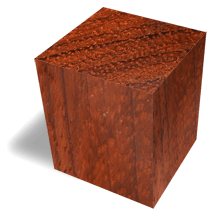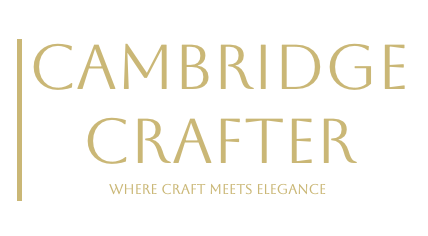
Padauk
Padauk, often referring to African Padauk (Pterocarpus soyauxii), is a tropical hardwood from the Fabaceae family, native to Central and West Africa, including countries like Cameroon, Nigeria, and the Congo Basin. It grows in tropical rainforests, reaching heights of 100–130 feet with trunk diameters of 3–5 feet, often with a straight, cylindrical bole and buttressed roots in older trees.
The heartwood of Padauk is a vivid, bright orange to deep reddish-orange when freshly cut, often described as “coral” or “vermilion,” but it darkens over time to a rich reddish-brown or deep purple-brown with exposure to light and air. The sapwood is a pale cream or yellowish-white, sharply distinct. The grain is typically straight to interlocked, with a medium to coarse texture and a moderate natural lustre, giving it a warm, glowing appearance when finished. Padauk may exhibit subtle figuring, such as faint stripes or mottling, adding to its visual appeal.
Padauk has a density of around 700–800 kg/m³, making it a hard, strong, and durable wood with excellent stability once seasoned. It’s highly resistant to decay, moisture, and insects, thanks to its natural oils, which also make it suitable for outdoor use. These oils can interfere with gluing and finishing—degreasing with a solvent like white spirit is recommended—and the wood’s bright colour can bleed into finishes if not sealed properly. The interlocked grain can cause tearout during planing, and its silica content may dull tools, so sharp, carbide-tipped blades are advised. Padauk sands and finishes well, with oil-based finishes enhancing its rich tones, though its colour may mellow over time.
When worked, Padauk has a mild, spicy scent, typical of many tropical hardwoods, with a hint of sweetness that fades after finishing. In the UK, it’s used for high-end furniture, cabinetry, flooring, and veneer, as well as boatbuilding and outdoor applications like decking or garden furniture, where its durability and vibrant colour are prized. It’s also popular for turned objects like bowls, pens, and knife handles, and occasionally for musical instruments, where it offers a bright, resonant tone.
Padauk is moderately priced for an exotic hardwood, though its cost can vary depending on availability and import regulations. Pterocarpus soyauxii is listed as vulnerable by the IUCN due to overexploitation and habitat loss, and while it’s not on CITES Appendices, export quotas in some African countries aim to manage its harvest. In the UK, it’s often sourced from certified suppliers to ensure sustainability, making it a striking and practical choice for projects requiring both beauty and resilience.
